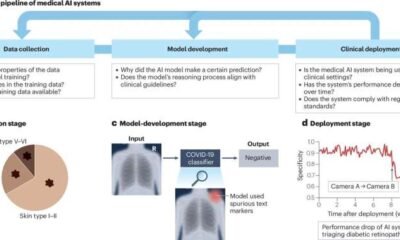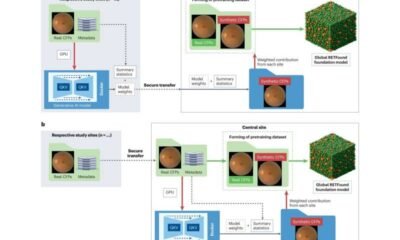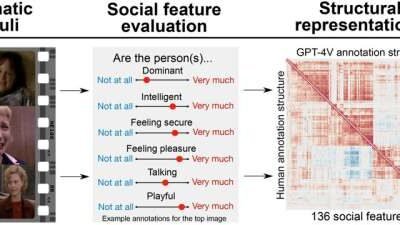AI Research
AI tools fall short in predicting suicide, study finds

The accuracy of machine learning algorithms for predicting suicidal behavior is too low to be useful for screening or for prioritizing high-risk individuals for interventions, according to a new study published September 11 in the open-access journal PLOS Medicine by Matthew Spittal of the University of Melbourne, Australia, and colleagues.
Numerous risk assessment scales have been developed over the past 50 years to identify patients at high risk of suicide or self-harm. In general, these scales have had poor predictive accuracy, but the availability of modern machine learning methods combined with electronic health record data has re-focused attention on developing new algorithms to predict suicide and self-harm.
In the new study, researchers undertook a systemic review and meta-analysis of 53 previous studies that used machine learning algorithms to predict suicide, self-harm and a combined suicide/self-harm outcome. In all, the studies involved more than 35 million medical records and nearly 250,000 cases of suicide or hospital-treated self-harm.
The team found that the algorithms had modest sensitivity and high specificity, or high percentages of people identified as low-risk who did not go on to self-harm or die by suicide. While the algorithms excel at identifying people who will not re-present for self-harm or die by suicide, they are generally poor at identifying those who will.
Specifically, the researchers found that these algorithms wrongly classified as low risk more than half of those who subsequently presented to health services for self-harm or died by suicide. Among those classified as high-risk, only 6% subsequently died by suicide and less than 20% re-presented to health services for self-harm.
“We found that the predictive properties of these machine learning algorithms were poor and no better than traditional risk assessment scales,” the authors say. “The overall quality of the research in this area was poor, with most studies at either high or unclear risk of bias. There is insufficient evidence to warrant changing recommendations in current clinical practice guidelines.”
The authors add, “There is burgeoning interest in the ability of artificial intelligence and machine learning to accurately identify patients at high-risk of suicide and self-harm. Our research shows that the algorithms that have been developed poorly forecast who will die by suicide or re-present to health services for the treatment of self-harm and they have substantial false positive rates.”
The authors note, “Many clinical practice guidelines around the world strongly discourage the use of risk assessment for suicide and self-harm as the basis on which to allocate effective after-care interventions. Our study shows that machine learning algorithms do no better at predicting future suicidal behavior than the traditional risk assessment tools that these guidelines were based on. We see no evidence to warrant changing these guidelines.”
More information:
Machine learning algorithms and their predictive accuracy for suicide and self-harm: Systematic review and meta-analysis, PLOS Medicine (2025). DOI: 10.1371/journal.pmed.1004581
Citation:
AI tools fall short in predicting suicide, study finds (2025, September 11)
retrieved 11 September 2025
from https://medicalxpress.com/news/2025-09-ai-tools-fall-short-suicide.html
This document is subject to copyright. Apart from any fair dealing for the purpose of private study or research, no
part may be reproduced without the written permission. The content is provided for information purposes only.
AI Research
Love and Artificial Intelligence – cbsnews.com
AI Research
NFL player props, odds, lines: Week 2, 2025 NFL picks, SportsLine Machine Learning Model AI predictions, SGP

The Under went 12-4 in Week 1, indicating that not only were there fewer points scored than expected, but there were also fewer yards gained. Backing the Under with NFL prop bets was likely profitable for the opening slate of games, but will that maintain with Week 2 NFL props? Interestingly though, four of the five highest-scoring games last week were the primetime games, so if that holds, then the Overs for this week’s night games could be attractive with Week 2 NFL player props.
There’s a Monday Night Football doubleheader featuring star quarterbacks like Baker Mayfield, C.J. Stroud and Justin Herbert. The games also feature promising rookies such as Ashton Jeanty, Omarion Hampton and Emeka Egbuka. Prop lines are usually all over the place early in the season as sportsbooks attempt to establish a player’s potential, and you could take advantage of this with the right NFL picks. If you are looking for NFL prop bets or NFL parlays for Week 2, SportsLine has you covered with the top Week 2 player props from its Machine Learning Model AI.
Built using cutting-edge artificial intelligence and machine learning techniques by SportsLine’s Data Science team, AI Predictions and AI Ratings are generated for each player prop.
Now, with the Week 2 NFL schedule quickly approaching, SportsLine’s Machine Learning Model AI has identified the top NFL props from the biggest Week 2 games.
Week 2 NFL props for Sunday’s main slate
After analyzing the NFL props from Sunday’s main slate and examining the dozens of NFL player prop markets, the SportsLine’s Machine Learning Model AI says Lions receiver Amon-Ra St. Brown goes Over 63.5 receiving yards (-114) versus the Bears at 1 p.m. ET. Detroit will host this contest, which is notable as St. Brown has averaged 114 receiving yards over his last six home games. He had at least 70 receiving yards in both matchups versus the Bears a year ago.
Chicago allowed 12 receivers to go Over 63.5 receiving yards last season as the Bears’ pass defense is adept at keeping opponents out of the endzone but not as good at preventing yardage. Chicago allowed the highest yards per attempt and second-highest yards per completion in 2024. While St. Brown had just 45 yards in the opener, the last time he was held under 50 receiving yards, he then had 193 yards the following week. The SportsLine Machine Learning Model projects 82.5 yards for St. Brown in a 4.5-star pick. See more Week 2 NFL props here.
Week 2 NFL props for Vikings vs. Falcons on Sunday Night Football
After analyzing Falcons vs. Vikings props and examining the dozens of NFL player prop markets, the SportsLine’s Machine Learning Model AI says Falcons running back Bijan Robinson goes Over 65.5 rushing yards (-114). Robinson ran for 92 yards and a touchdown in Week 14 of last season versus Minnesota, despite the Vikings having the league’s No. 2 run defense a year ago. The SportsLine Machine Learning Model projects Robinson to have 81.8 yards on average in a 4.5-star prop pick. See more NFL props for Vikings vs. Falcons here.
You can make NFL prop bets on Robinson, Justin Jefferson and others with the Underdog Fantasy promo code CBSSPORTS2. Pick at Underdog Fantasy and get $50 in bonus funds after making a $5 wager:
Week 2 NFL props for Buccaneers vs. Texans on Monday Night Football
After analyzing Texans vs. Buccaneers props and examining the dozens of NFL player prop markets, the SportsLine’s Machine Learning Model AI says Bucs quarterback Baker Mayfield goes Under 235.5 passing yards (-114). While Houston has questions regarding its offense, there’s little worry about the team’s pass defense. In 2024, Houston had the second-most interceptions, the fourth-most sacks and allowed the fourth-worst passer rating. Since the start of last year, and including the playoffs, the Texans have held opposing QBs under 235.5 yards in 13 of 20 games. The SportsLine Machine Learning Model forecasts Mayfield to finish with just 200.1 passing yards, making the Under a 4-star NFL prop. See more NFL props for Buccaneers vs. Texans here.
You can also use the latest FanDuel promo code to get $300 in bonus bets instantly:
Week 2 NFL props for Chargers vs. Raiders on Monday Night Football
After analyzing Raiders vs. Chargers props and examining the dozens of NFL player prop markets, the SportsLine’s Machine Learning Model AI says Chargers quarterback Justin Herbert goes Under 254.5 passing yards (-114). The Raiders’ defense was underrated in preventing big passing plays a year ago as it ranked third in the NFL in average depth of target allowed. It forced QBs to dink and dunk their way down the field, which doesn’t lead to big passing yardages, and L.A. generally prefers to not throw the ball anyway. Just four teams attempted fewer passes last season than the Chargers, and with L.A. running for 156.5 yards versus Vegas last season, Herbert shouldn’t be overly active on Monday night. He’s forecasted to have 221.1 passing yards in a 4.5-star NFL prop bet. See more NFL props for Chargers vs. Raiders here.
How to make Week 2 NFL prop picks
SportsLine’s Machine Learning Model has identified another star who sails past his total and has dozens of NFL props rated 4 stars or better. You need to see the Machine Learning Model analysis before making any Week 2 NFL prop bets.
Which NFL prop picks should you target for Week 2, and which quarterback has multiple 5-star rated picks? Visit SportsLine to see the latest NFL player props from SportsLine’s Machine Learning Model that uses cutting-edge artificial intelligence to make its projections.
AI Research
What Is One of the Best Artificial Intelligence (AI) Stocks to Buy Now? – The Motley Fool
-

 Business2 weeks ago
Business2 weeks agoThe Guardian view on Trump and the Fed: independence is no substitute for accountability | Editorial
-
Tools & Platforms1 month ago
Building Trust in Military AI Starts with Opening the Black Box – War on the Rocks
-

 Ethics & Policy2 months ago
Ethics & Policy2 months agoSDAIA Supports Saudi Arabia’s Leadership in Shaping Global AI Ethics, Policy, and Research – وكالة الأنباء السعودية
-

 Events & Conferences4 months ago
Events & Conferences4 months agoJourney to 1000 models: Scaling Instagram’s recommendation system
-

 Jobs & Careers3 months ago
Jobs & Careers3 months agoMumbai-based Perplexity Alternative Has 60k+ Users Without Funding
-

 Podcasts & Talks2 months ago
Podcasts & Talks2 months agoHappy 4th of July! 🎆 Made with Veo 3 in Gemini
-

 Education2 months ago
Education2 months agoVEX Robotics launches AI-powered classroom robotics system
-

 Education2 months ago
Education2 months agoMacron says UK and France have duty to tackle illegal migration ‘with humanity, solidarity and firmness’ – UK politics live | Politics
-

 Podcasts & Talks2 months ago
Podcasts & Talks2 months agoOpenAI 🤝 @teamganassi
-

 Funding & Business3 months ago
Funding & Business3 months agoKayak and Expedia race to build AI travel agents that turn social posts into itineraries























